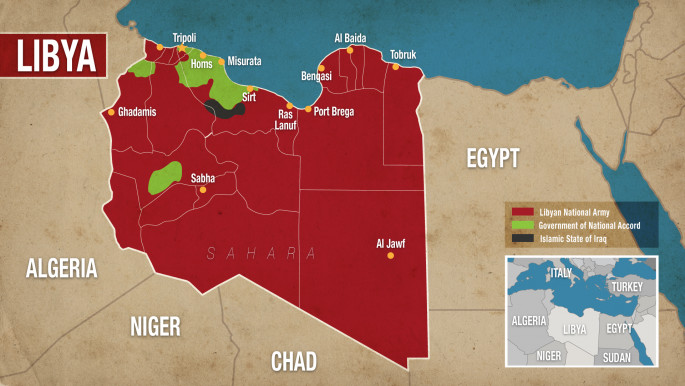Libya accuses France of backing 'dictator' Khalifa Haftar
Libyan Prime Minister Fayez al-Sarraj, head of the internationally-recognised government in Tripoli, angrily blasted France on Wednesday for allegedly supporting rogue general Khalifa Haftar, underlining the growing diplomatic tensions over the recent fighting there.
Speaking to French daily Liberation, Sarraj denounced Paris for backing a "dictator," in his harshest criticism yet of French diplomacy.
France has long been suspected of backing Haftar, a former Gaddafi general based in eastern Libya who heads the self-styled Libyan National Army (LNA) and who launched a drive towards Tripoli where Sarraj's UN-recognised government is based earlier this month.
Fighting between rival militia groups in the capital has claimed 264 lives and left more than 1,200 wounded. Fighting in Tripoli's southern suburbs has so far displaced at least 35,000 people, UN humanitarian coordinator for Libya said Monday.
"We are surprised that France does not support our government that is democratic, but supports a dictator," Sarraj told Liberation.
"When (French President) Emmanuel Macron called me, I warned him that public opinion was against France. We don't want Libyans to hate France. France still has a positive and important role to play," he said.
In a separate interview with the Le Monde newspaper on Monday, Sarraj said France was partly to blame for Haftar's offensive on Tripoli.
"The disproportional support from France towards Haftar is what made him decide to take action and abandon the political process," he said.
France publicly denies supporting Haftar. It says it has contact with all the actors in war-ravaged Libya, where a complex mosaic of militias and political factions are competing for advantage.
While its role remains ambiguous, analysts say Paris sees Haftar and his self-styled Libyan National Army as a potential stabilising force in a country rocked by years of conflict.
International divisions
UN special envoy for Libya, Ghassan Salame, speaking in Rome Wednesday said he hoped meetings he had with opposing parties on the ground would "bear fruit" before the start of the Muslim fasting month of Ramadan on May 5.
Salame, at a press conference with Italian Foreign Minister Enzo Moavero Milanesi, did not hide the difficulties involved in resolving the conflict.
"I am as concerned by the fighting on the ground as I am by the divisions within the international community," he said.
France has long had links with Haftar, who was invited to Paris alongside Sarraj in 2017 in what was seen as an ambitious gamble by Macron shortly after he was elected president.
That marked the beginning of Haftar's appearance on the international stage. Last year he was invited back to Paris for a major peace conference of the various factions which helped legitimise him.
"The two invitations from President Macron completely changed the image and positioning of Haftar," Virginie Collombier, an academic specialising in Libya at the European University Institute in Florence, told AFP.
 |
'Big schock'
Haftar's bold move on Tripoli three weeks ago appeared to have taken the international community by surprise, but raised questions about possible French complicity - an idea firmly dismissed by Paris.
"It was a big shock," said a diplomatic source at the foreign ministry, insisting France had "no prior knowledge" of the offensive.
Haftar's campaign began barely two weeks after French Foreign Minister Jean-Yves Le Drian met him in his eastern stronghold of Benghazi during a ministerial trip on which he also met Sarraj.
Michel Duclos, a former ambassador who advises the Paris-based think tank Institut Montaigne, said it is "a high-stakes affair for French diplomacy. It has given the impression in recent years of compromising with a dictator in the making".
Collombier from the European University Institute said France's proximity to Haftar meant it had "lost all credibility with some of the actors in Libya" and had also caused strains with EU partner Italy.
Speaking in Paris on Wednesday, Le Drian urged both Sarraj and Haftar to "stick to the agreement" reached in Abu Dhabi in February, referring to talks between them at which they agreed to work towards organising elections.
Bulwark against Islamists?
Haftar is increasingly seen by his allies, which include Russia and Egypt, as a bulwark against Islamists who gained a foothold after the 2011 uprising that ousted dictator Muammar Gaddafi.
Haftar won overt backing from US President Donald Trump last week too.
The White House said Trump "recognised Field Marshal Haftar's significant role in fighting terrorism and securing Libya's oil resources" during a phone call between the two men.
That came a day after Russia and the United States opposed a British bid at the UN Security Council, backed by France and Germany, to demand a ceasefire in Libya.
Haftar has steadily expanded his control of Libya. Following a thrust southwards early this year, he says he now controls some 90 percent of the country and has turned his sights on the capital.





 Follow the Middle East's top stories in English at The New Arab on Google News
Follow the Middle East's top stories in English at The New Arab on Google News
![Israeli forces ordered bombed Gaza's Jabalia, ordering residents to leave [Getty]](/sites/default/files/styles/image_330x185/public/2176418030.jpeg?h=a5f2f23a&itok=_YGZaP1z)

